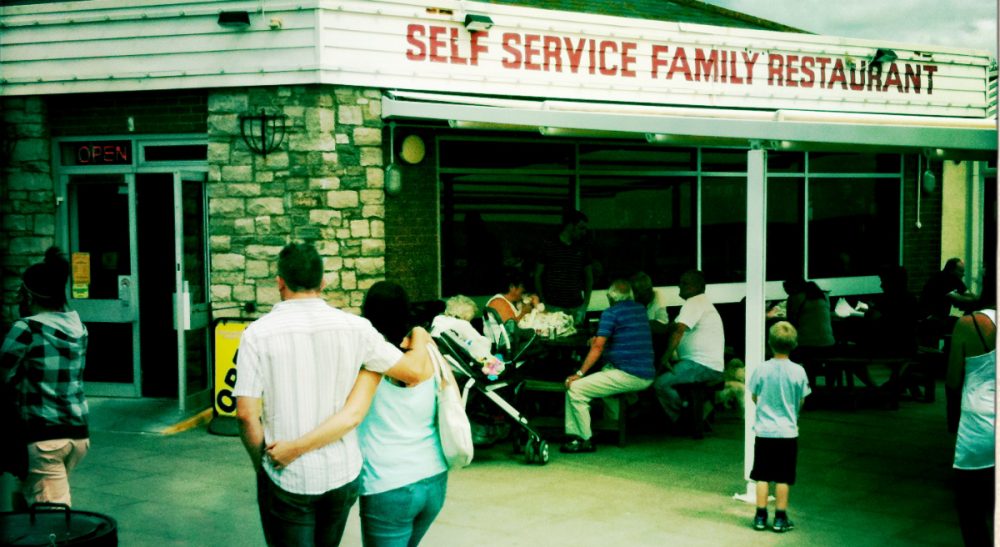Advertisement
The Economic Downside Of Doing It Yourself

I don’t pump my own gas. Or bag my own groceries. Or pour my own coffee in a coffee shop. I’d rather wait to be waited on than wait on myself. I’m not lazy; I’m concerned about jobs. Specifically, about jobs being eliminated. Actually, that’s incorrect. These jobs are not being eliminated; they’re being handed over to us – sans pay.
We pump our own gas and put air in our own tires, and oil companies get rid of employees. We scan and bag our own groceries and the cashiers and baggers who used to have those jobs get fired.
I am not referring to the jobs that are being taken over by automation or being outsourced to other countries, but about the ones that are being outsourced to us, the customers. We do the work, but we don’t pay less for the groceries, the coffee or, in most instances, the gas. We pump our own gas and put air in our own tires, and oil companies get rid of employees. We scan and bag our own groceries and the cashiers and baggers who used to have those jobs get fired.
When we go out for coffee, we’re handed a cup and allowed the privilege of pouring our own, adding whatever cream or sugar we like, and carrying it to a table. When we’re through, we’re expected to bus that table, too. We do all this, and then we lament the high and seemingly intransigent unemployment numbers, without connecting the dots.
President Obama connected them in a Today show interview in 2011. “When you go to a bank, you use the ATM, you don’t go to a bank teller,” he said. “Or you go to the airport, and you use a kiosk, instead of checking in at the gate.”
“Self-checkout…has saved retailers tons of money,” reports the industry newsletter Self Service World. Businessbee.com similarly reports that one of the arguments in favor of self-checkouts is “fewer employees to pay.”
The U. S. Department of Labor statistics report that unemployment in the service sector was 7.6 percent in August. That’s better than the 8.4 percent of a year ago, but not by much.
The jobs that are eliminated may not be great jobs, but they’re crucial ones. When they go to teenagers, they help instill a work ethic and give kids money they can contribute to the family coffers or save for college or a car. Jobs teach kids how to meet schedules, deal with bosses and talk to customers.
When those jobs go to adults, they may help support a household. They may be a second job that helps ends meet. Or they are the start of a career. Once upon a time, a bus boy could rise through the ranks to waiter, host and manager. In eliminating these jobs, we are kicking out the first rung of the ladder to success. There are fewer and fewer of the kinds of jobs that used to be called entry level. And if you can’t even enter, how can ascend?
It’s not always easy to avoid self-service, but I try to whenever possible. I know where the local full-service gas stations are, and I patronize them. I try to keep the tank half full so I won’t risk running so low that I have to pump gas for myself.
At branches where people still check books in and out, we have conversations. They ask me what I think of the book I’m returning. They recommend books I might like – more accurately than Amazon. The self-service scanners don’t speak to me.
I don’t like to scan the books I borrow from the library myself, but at the main branch of the Boston Public Library in Copley Square, I don’t have a choice. Book checkout and return is all self-service now. When I request a book, it’s held on a special rack where I have to get it myself. At branches where people still check books in and out, we have conversations. They ask me what I think of the book I’m returning. They recommend books I might like – more accurately than Amazon. The self-service scanners don’t speak to me.
Because I don’t bus my own tables, I leave a small tip so the server who does bus it gets something for his or her trouble. In my more rational moments, I think this is a futile gesture. In my more positive ones, I hope it will encourage the shop to employ more servers. When I’m feeling wildly optimistic, I think the idea will catch on, everyone will do it, and lots of jobs will come back.
I know I’m not completely alone in this. Despite all the self-service checkouts at my local drug store, many customers choose to queue up and wait for an actual cashier. It’s the same at the supermarket. We’re human. We like human contact.
Doing it yourself is sometimes faster. It may be more convenient. But it’s not better. So the next time you go out for coffee, go where you can sit back, relax, and let someone else serve it. Someone who gets paid.
Related:
